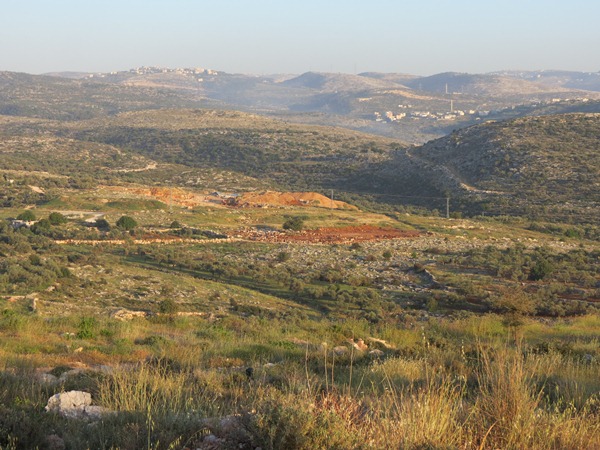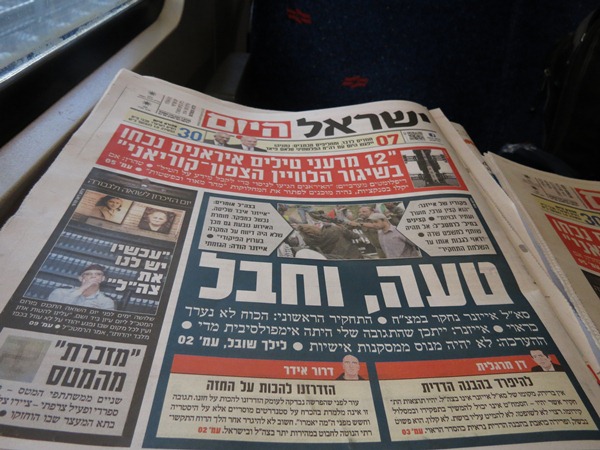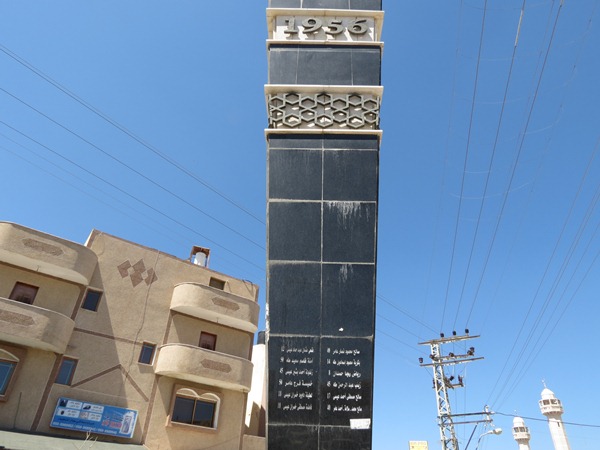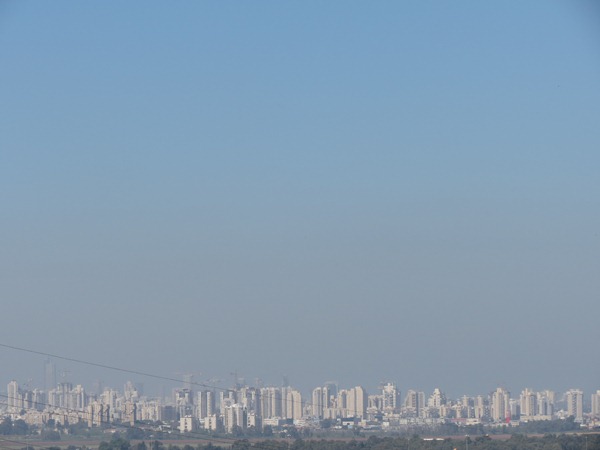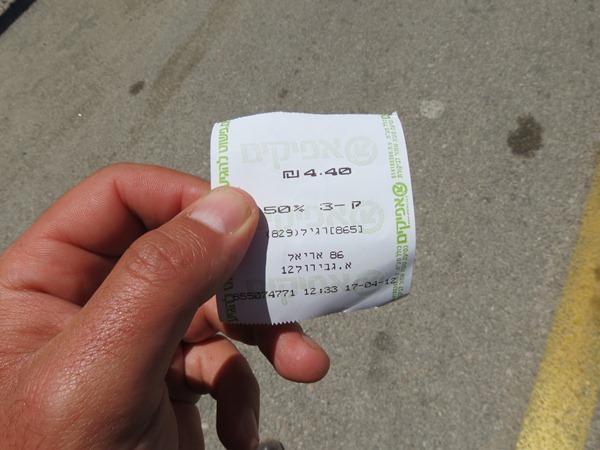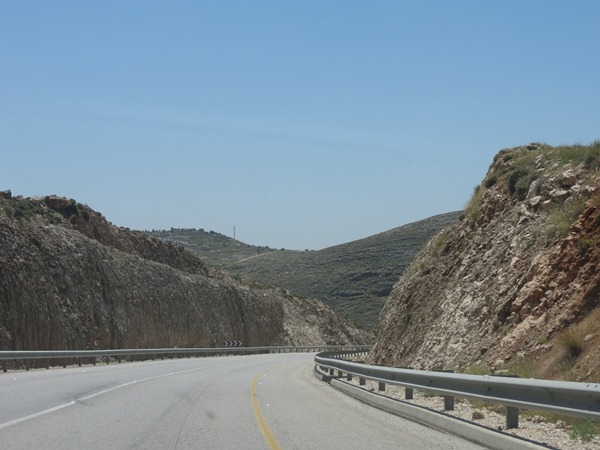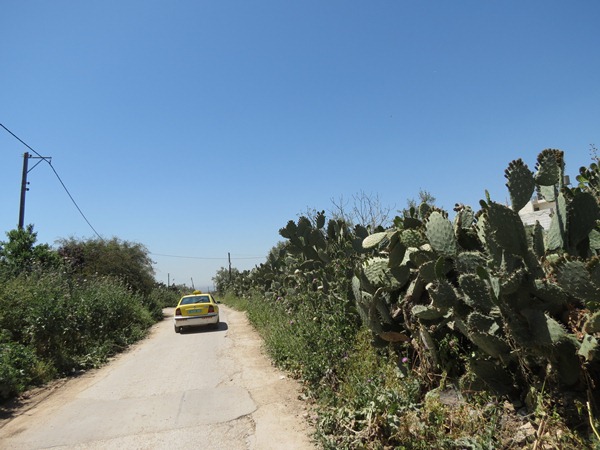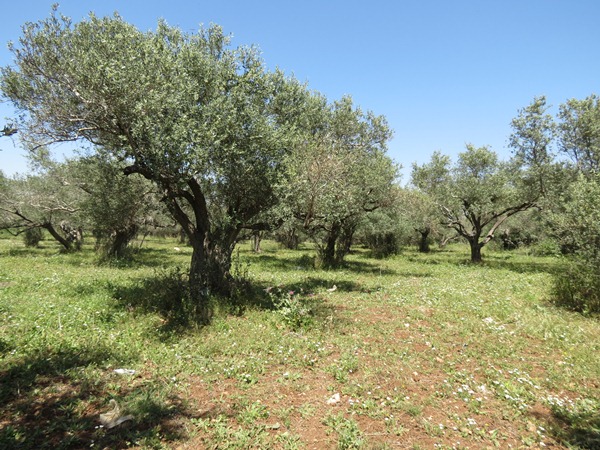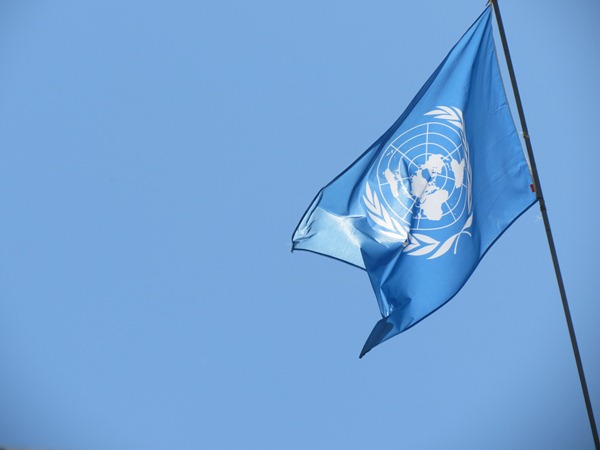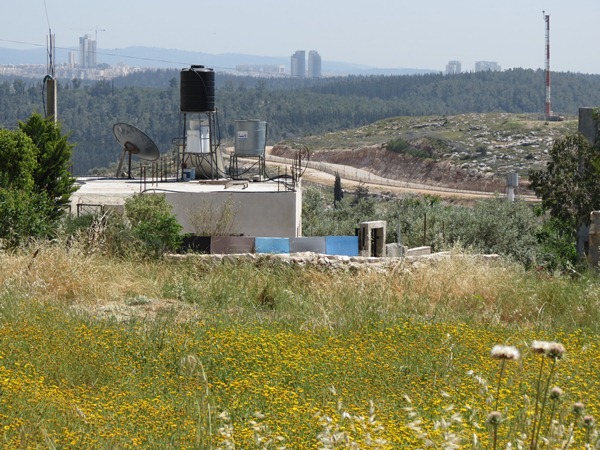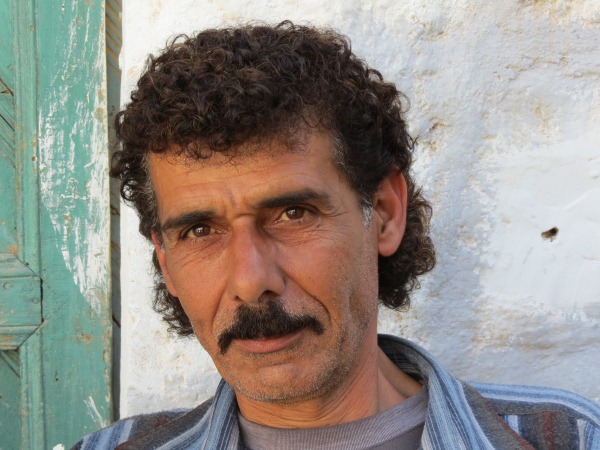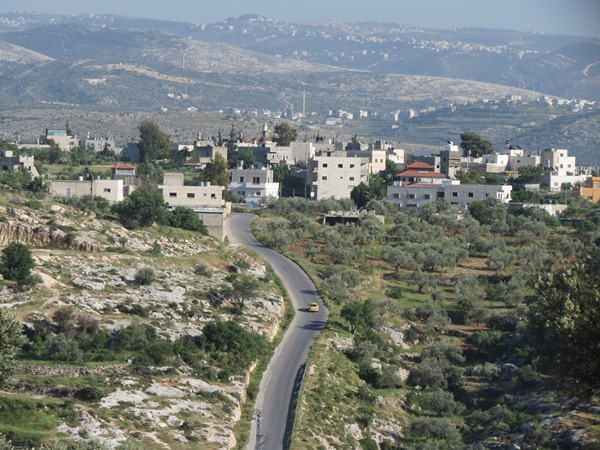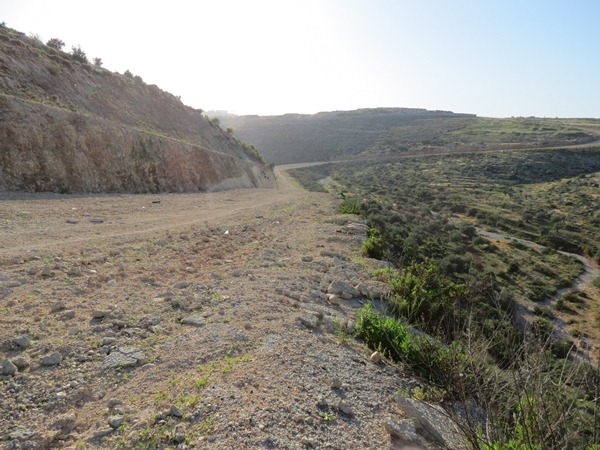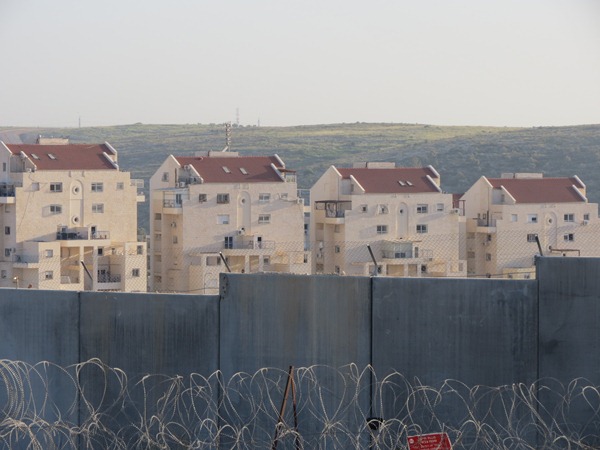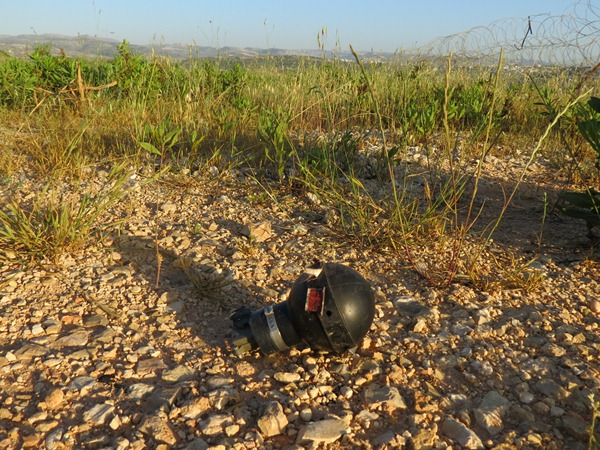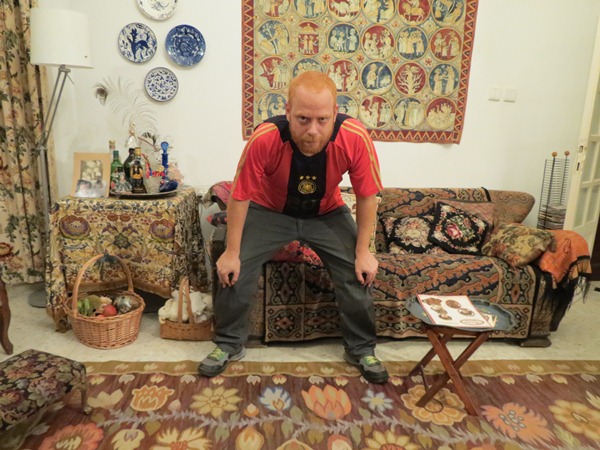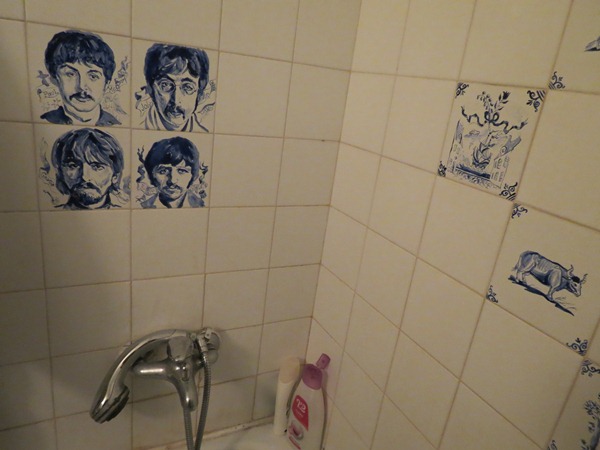From Kafr Qasim to Givon Hahadasha via a salvaged olive grove, a once-imprisoned pool-hall owner and a Portuguese-styled shower.
On the train from my soft bed back to Rosh Ha’ayin the following morning, I read the freebie “Israel Hayom,” Israel’s most widely read newspaper. The chief headline refers to the brutal treatment of the Danish demonstrator (who by now deserves to be named, he is Andreas Ias) by a high-ranking Israeli officer (who also deserves to be named. He is Shalom Eisner. The headline reads: “Made a mistake, too bad.”
Next to this heartwarming expression of acceptence, a smaller headline sets the mood for Holocaust memorial day, which will be observed on Thursday. It reads: “Now we have the IDF.” The reader is expected to complete the sentence in his or her mind: “so no such harm will come our way again.” We should really be glad for the IDF, because, as the very top headline reads, Iranian observers were present at the recent North Korean missile experiment.
I’m often amazed by how effectively my fellow Israelis complete sentences, and sorry that I don’t fully share this talent. It would have been so easy to accept that Eisner “made a mistake” of the sort that can be taken with a shrug, or that all the IDF does is work day and night purely in order to prevent the next impending Holocaust. Instead I have to sit here feeling rather tense before this day of traveling, which is due to lead me back into the West Bank and to some pretty difficult places.
One difficult place awaits me directly outside Rosh Ha’ayin, and still entirely within Israel proper. The Palestinian town of Kafr Qasim was the site of a hideous massacre in the year 1956. At that time, Arab citizens of Israel were put under martial law and curfews were frequent. One day, a local commander decided to declare a surprise curfew in the early afternoon. Anyone breaking it was to be shot to death. The officer deserves to be named. His name is Issachar Shadmi.
One junior officer pointed out to Shadmi that many of the villagers were still out in the fields and groves when the curfew was announced, and will arrive back in Kafr Qasim not aware of it. To this the Shadmi responded: “May god have mercy on their souls.”
The soldiers carried out their order with the same efficiency with which they prevent holocausts to this very day. Villagers who arrived in the town were taken off their cars and donkeys and shot at point blank. Forty-eight people were murdered, including six women and 23 children between the ages of eight and 17. Following the events, Shadmi was put on trial. The court decreed that he must pay a fine of ten prutot (pennies) for his naughty ways.
Made a mistake. Too bad.
Kafr Qasim is situated at the rim of the Tel Aviv metropolitan area. Sadly, though, all the photos of the city I’m taking here come out full of electric wires.
I walk over to the Afek industrial park, which sits detached from the village and is home to mostly Jewish Israeli businesses. One strategically-situated high rise here should lift me above the obstructions, but the guard at the entrance denies me access beyond the lobby.
To be fair, he does call someone else to consult. “There’s some guy here who wants to take a photo of the city for Independence Day,” he explains. I never mentioned anything about Independence Day, which is a week away, but the clever guard readily completed my sentence. Why would anyone take a photo of anything in this country if not for patriotic purposes?
Dear God, again I have become bitter and cynical too early in the morning. I should think back to yesterday and focus on the positive. Life is so full of good surprises. Take my bus fare from here into the West Bank. It’s cheaper than any in Israel itself, since buses to the settlements are subsidized. Of course they are subsidized by my own tax money, so in a way I paid the difference indirectly, but at least somewhere in this country public transportation is reasonably priced.
One thing I would like to say without a hint of criticism: Settlers give lifts, and deserve credit for that. Of course they usually give them to their own kind or to whom they consider their own kind, but nowhere in the world have I known people with such an easy foot on the breaks, turning the West Bank into a hitchhiker’s paradise. Once the bus lets me off, I decide to try to take care of some of my business in the city by phone, but that is impossible. I have to hang up with each car that appears.
It is a Palestinian cab driver, however, who takes me all the way to my next destination. We first travel through roads shared by settlers and Palestinians, but which were designed for the settlers. For some reason such roads are often paved through dynamited rock, literally cutting through the terrain. There’s usually a security reasoning behind such oddities. So I should complete the sentence by saying: “and this keeps us safe,” but unfortunately my honest thoughts are: “This is agressive and ugly.”
We turn off to roads not typically used by settlers, though settlers are not barred from using them, this being the IDF-controlled Area C. The villages through which we wind show little connection to the present day, especially in their dusty and poor historical nuclei. The first is Shuqba, then comes Qibya, then finally we are in Budrus, a place that feels incredibly remote, but is in fact a chicken’s flight away from my Tel Aviv home.
The separation barrier runs right by this small village. Originally it was supposed to run through it and even engulf part of it. Budrus was to be cut off from its olive groves, which are its livelihood, which are its identity, which are its property. A long and intense non-violent struggle bore fruit here, and almost all the trees remain on the village’s side.
I walk through the groves and they are beautiful. Giant lizards climb the tree trunks, butterflies appear and vanish and reappear. The grass is rich beneath the trees. All is peaceful here, at the foot of a tall military communications tower.
Budrus has other problems beside the fence, or it wouldn’t have needed the UN to undertake projects here.
Had I lived here, however, I suppose my biggest problem would have been trying to work out the enigma of this existence. I mean, here is life as we know it, and then there, in the distance, there’s a double electric fence with a patrol road, then beyond that is a thick man-made forest of pines, out of which stick the high-rises of people who cannot speak my language and who imprisoned my father.
And what would it feel like to live in the nearby town on Ni’lin, where soldiers come in nightly, armed to the teeth, and take people away like a host of fairies out of some dark poem by Yeats. Osman, the owner of the local pool hall, was last abducted a year ago. He was kept handcuffed for over twelve hours, and released only after eight days in custody.
Israel holds Palestinian prisoners for indefinite amounts of time without trial, with the help of a convenient concept known as “administrative detention.” When someone is freed in only over one week, that means he wasn’t even truly suspected of activism. The soldiers pulled Osman from his bed and away from his family for no reason. They made a mistake. Too bad.
And what if he were an activist? Can a man be called criminal for fighting to preserve the lands of his village? On this very day (Tuesday), “Prisoners’ Day” is observed throughout the West Bank and the Gaza Strip. Forty percent of Palestinian men living in the occupied territories have been detained by Israel at some point in their lives.
I realize that there are exploding buses in this world. I know that there are people in the West Bank who are dreaming up ways to kill me, but please allow me to complete this sentence: “because they are angry” rather than “because they are evil, Holocaust-inspired demons.” Fundamentalism and political extremism turn extra-destructive when anger is mixed in. Rather than work on reducing the anger factor, Israel chose to enhance it by constructing its fence unilaterally wherever it saw fit.
This fence can’t possibly pose a great obstacle for determined terrorists, so long as settlers are present in the West Bank, and must travel in and out without a sense of having crossed between territories. The many gates demanded for this effect render the physical obstacle ineffective as a means of security, while it remains a perfectly effective means of land theft.
I put up my own ineffective means of security by pretending again to be Greg from England. Just as the barrier enhances animosities, so does my lie.
“The people who really ruined Palestine are you, the British,” says Osman “First learn your own history, then come to Palestine.”
I know my history. I am an Israeli. and I know that in the history of Israel the name of the next village, Bil’in, will remain as the darkest of stains.
Bilin’s land theft was so excessive, that even Israel’s supreme court decreed the fence must be moved. The decree was published already in 2007, but Israel failed to act on its own High Court’s decision. It took four more years of weekly demonstrations, with the participation of Israeli and foreign activists, until the fence was moved a few hundred meters to the west. There was no moving it further to the Green Line itself, since by now a dense settlement of boxey apartment blocks had already been built on the village’s lands.
Over those four years, the struggle claimed lives. Demonstrator Bassam Abu-Rahme died when a flying tear gas container hit him in the chest. His sister Jawaher collapsed in the middle of a dense cloud of tear gas and died later in the hospital. The IDF’s tear gas supply was then found to be greatly out of date and possibly toxic, but staying frugal is important when preventing Holocausts. My great grandparents were gassed to death with their children in Birkenau. Gassing Jawaher Abu-Rahma to death assures us that this will never happen again.
I’ve been gassed here too, not to death, of course, only to a point of great discomfort. I return now to the site of those demonstrations: small battles of stones vs tear gas, stun grenades, rubber bullets and gushes of stinking water that stick to the clothes and skin for day. The fence in no longer here. Even the asphalt road was shaved off.
So Israel made a mistake, too bad, and then it was confronted with its mistake, oh well, and then it took four entire years to correct its mistake, too bad. Finally it put up a new fence which is in fact a wall, and is already at work on building a brand new settlement directly across it. Oh well.
For the Palestinians and their sympathizers, “oh well” is not enough. The demonstrations continue and the ground next to the new wall is already littered with tear gas containers.
You may be surprised by where I am about to spend the night. It’s on a settlement, a proper settlement named Givon Hahadasha, which is located just east of here, and where my dear friend Ezra lives. Ezra grew up here, then moved into Israel for part of his life, but returned to his parents’ home for practical purposes. Tonight FC Bayern will be playing Real Madrid at the Champions league semifinals. Ezra, a fan of German football, is ready for the game, wearing a Lukas Podolski Jersey.
Ezra’s parents immigrated from the Soviet Union directly to the West Bank in the 1970s. Ezra can thus be said to be an “economic settler,” like the majority of Israelis who live across the line, while his parents are more politically motivated. “If we’re going to be Zionists” Ezra’s mother, Ira, explains over dinner, “then let’s be Zionists.”
It’s so easy to be furious at someone who holds such views and even hate them, following a day like this, that is, until one steps into the shower. Ira is an illustrator, and her cute dream house is covered with tiles she herself decorated in Portuguese style. Here in the shower, she immortalized the already immortal Fab Four.
Ira knows full well that in the end, the love you take is equal to the love you make. She’s not a racist and neither is she a warmonger. Being a free thinker, she’s not even a blind completer of sentences. She simply sees things differently than I do, very differently. Oh well.
_______________________________________
The Round Trip thus far!
View Larger Map
Thanks for reading and taking part in the adventure. All writing on this site is done voluntarily, so if any of you would like to pitch in directly for my travel expenses, please click here or on the “donate” button at the top of this page to do so. I’m deeply grateful to those who already donated. Thank you so much! This project would be impossible if not for you.
Relive the first two journeys:
The September Journey
The Christmas Journey


